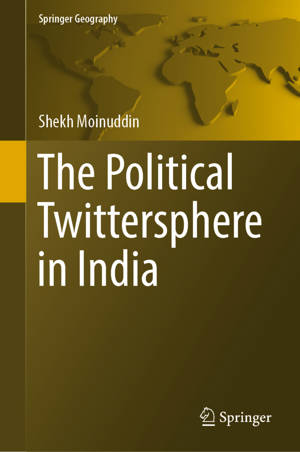
- Retrait gratuit dans votre magasin Club
- 7.000.000 titres dans notre catalogue
- Payer en toute sécurité
- Toujours un magasin près de chez vous
- Retrait gratuit dans votre magasin Club
- 7.000.0000 titres dans notre catalogue
- Payer en toute sécurité
- Toujours un magasin près de chez vous
105,45 €
+ 210 points
Description
The book investigates political re/tweets that reveal the nature and patterns of politics and digital political revolution in India. The re/tweets are made by Indian politicians at various capacities in order to communicate to followers, which shaped the political discourse in form of response, activism, and technology. The book is based on interdisciplinary approaches wherein geography interfaces with political, cultural, social, economic and social media studies.
The book is mapping patterns of spatial politics through Twitter which revolutionized the digital politics in India. It discusses and answers the questions: Why do politicians use Twitter and other social networking sites? When do politicians make re/tweets? Is Twitter all about official?
The book triggers questions about the politics of gadgets. To what extent are politics inseparable from re/tweets? The book adheres the inevitable role of technology, particularly of Twitter in day-to-day spatial reporting in the shape of politics, culture, identity, ideology, norms and empiricism.
This book is the result of the research project "Mapping Political Tweets: The Digital Political Revolution in India" (2015-16), funded by Kalindi College, University of Delhi, New Delhi. KC/GB/3349(a).
The book appeals to research scientists, graduate students and practitioners in the fields of political science, media representation, communication, and those who have interests to investigate the linkages between different parts of geography and social science with communication technology.
The book is mapping patterns of spatial politics through Twitter which revolutionized the digital politics in India. It discusses and answers the questions: Why do politicians use Twitter and other social networking sites? When do politicians make re/tweets? Is Twitter all about official?
The book triggers questions about the politics of gadgets. To what extent are politics inseparable from re/tweets? The book adheres the inevitable role of technology, particularly of Twitter in day-to-day spatial reporting in the shape of politics, culture, identity, ideology, norms and empiricism.
This book is the result of the research project "Mapping Political Tweets: The Digital Political Revolution in India" (2015-16), funded by Kalindi College, University of Delhi, New Delhi. KC/GB/3349(a).
The book appeals to research scientists, graduate students and practitioners in the fields of political science, media representation, communication, and those who have interests to investigate the linkages between different parts of geography and social science with communication technology.
Spécifications
Parties prenantes
- Auteur(s) :
- Editeur:
Contenu
- Nombre de pages :
- 177
- Langue:
- Anglais
- Collection :
Caractéristiques
- EAN:
- 9783030116019
- Date de parution :
- 07-02-19
- Format:
- Livre relié
- Format numérique:
- Genaaid
- Dimensions :
- 234 mm x 239 mm
- Poids :
- 453 g

Les avis
Nous publions uniquement les avis qui respectent les conditions requises. Consultez nos conditions pour les avis.






